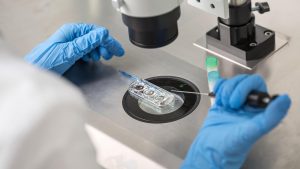Polycystic ovary syndrome is complex hormonal disorder that effects around 11% of women in the world. The word “Polycystic” literally translates to “many cysts”, referring to many partially formed follicles in the woman’s ovary that contain eggs but rarely reach maturity or grow. PCOS is one of the most common endocrine conditions that causes infertility in women and is associated with other medical problems such as type 2 diabetes.
In a recent study published in The Journal of Clinical Endocrinology and Metabolism, researchers found a genetic component to the development of PCOS, the discovery enabling a more personalised medical approach when it comes to fertility treatment.
The study explored the genetic basis of PCOS and found that reproductive and metabolic hormone levels were associated with rare genetic variants in genes that were associated with male hormone production. This basically means that the genes that were responsible for making the small amounts of testosterone in the ovary, ended up crating creating larger amounts.
This research could potentially lead to new therapies that will help treat and diagnose PCOS in women who are suffering from infertility and uncover some of the hereditary processes that are involved with the disease, helping us to understand the disorder on a molecular level.







